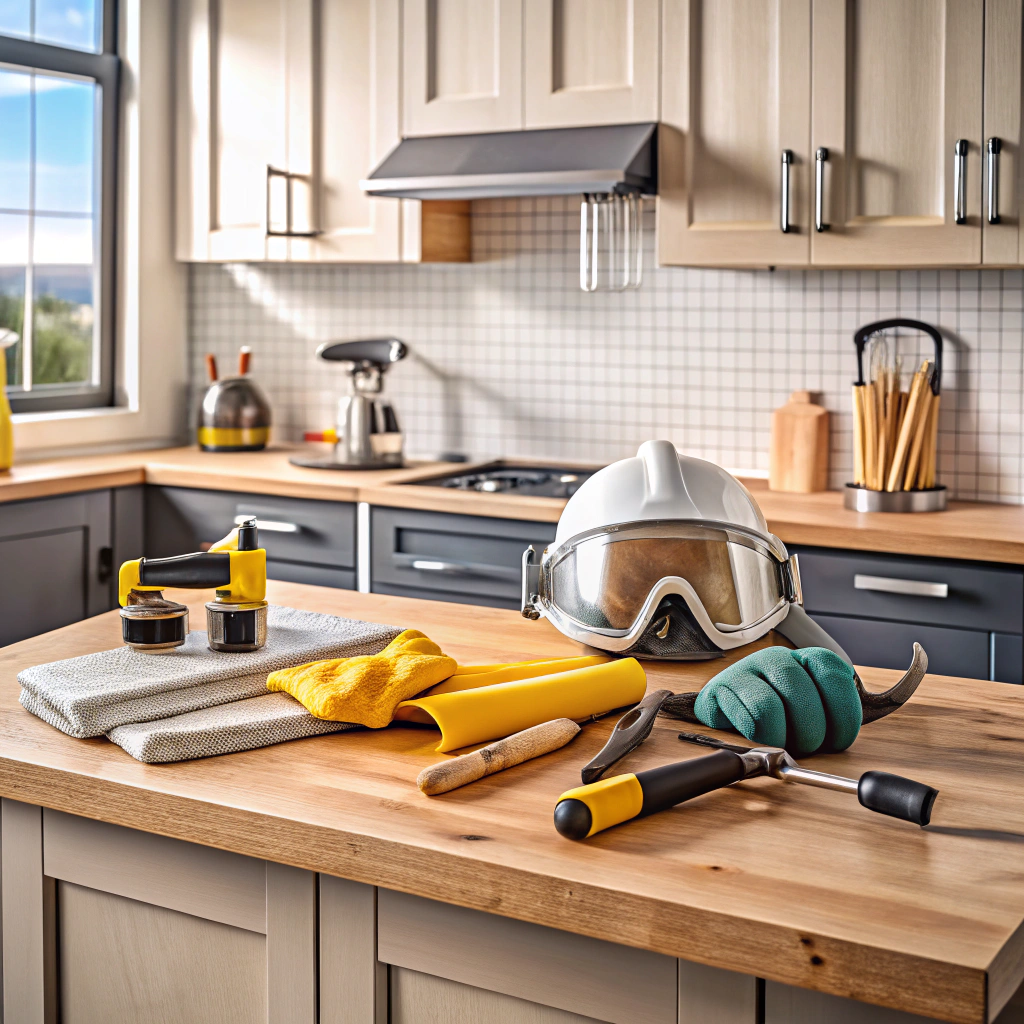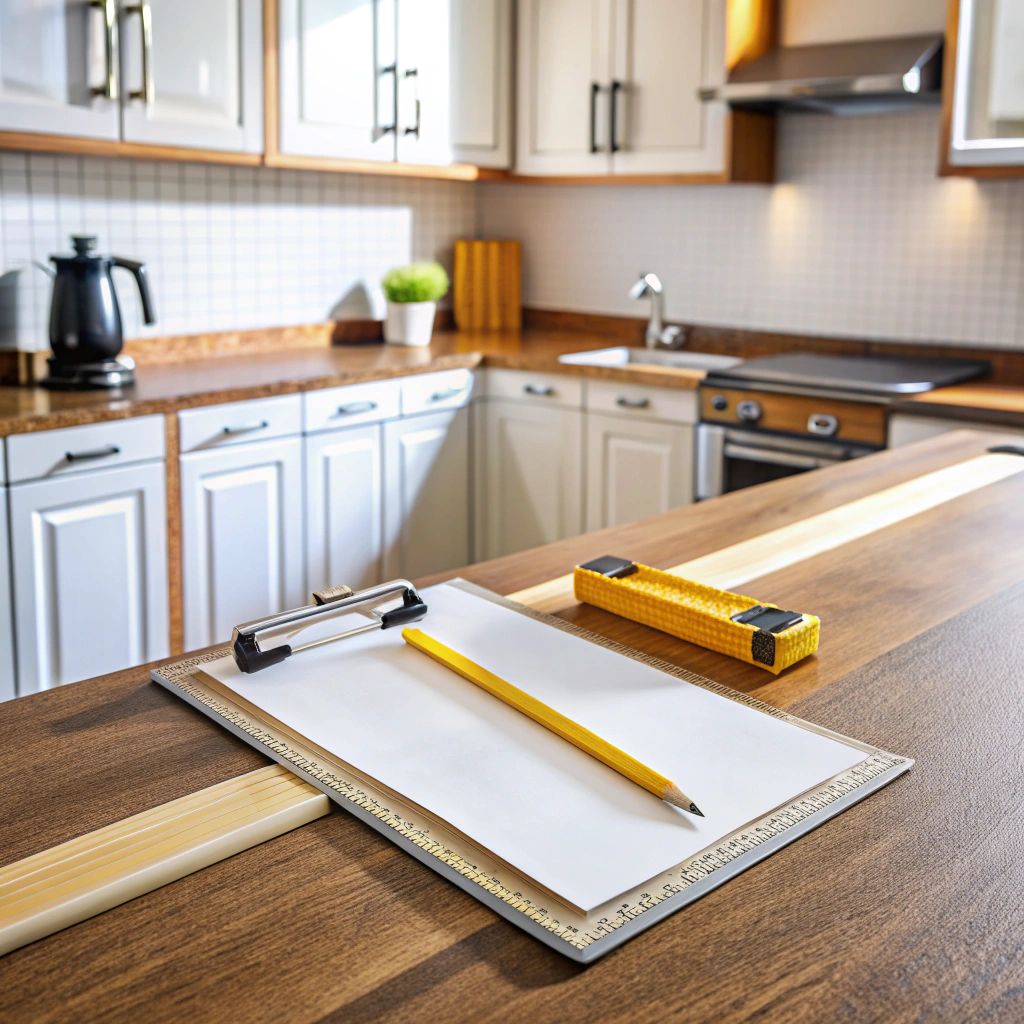Last updated on
Navigating the process of hiring a contractor for your kitchen remodel can be complex, but this guide will help simplify the steps and ensure you make an informed decision.
Are you ready to give your kitchen a much-needed makeover? A kitchen remodel can completely transform the look and feel of your home, but it’s not a project you want to tackle on your own. Hiring a contractor for your kitchen remodel is essential to ensure that the job is done right and within budget.
But with so many contractors out there, how do you know which one is the best fit for your project? In this article, we’ll walk you through the steps of hiring a contractor for your kitchen remodel, from finding potential candidates to making the final decision. So grab a cup of coffee and let’s dive in!
What's Inside
“Understanding Your Kitchen Remodeling Needs”

Before you start searching for a contractor, it’s crucial to have a clear understanding of your kitchen remodeling needs. Take some time to envision what you want your new kitchen to look like and how you want it to function.
Consider factors such as the layout, storage space, appliances, lighting, and overall aesthetic.
Think about the specific problems or limitations of your current kitchen that you’d like to address with the remodel. Are there not enough cabinets or countertop space? Is the layout inefficient? Do you need more natural light?
By identifying these needs upfront, you’ll be better equipped when discussing your vision with potential contractors. It will also help them understand what is most important for your project and provide accurate recommendations.
Consider any future plans or changes in lifestyle that may impact how you use your kitchen. For example: if children are in the picture or if aging parents might move in soon.
“Defining The Scope of Your Kitchen Remodel”

This step will help you communicate your vision clearly to potential contractors and ensure that everyone is on the same page.
Defining the scope involves determining what aspects of your kitchen you want to change or improve. Are you looking for a complete overhaul, including new cabinets, countertops, flooring, and appliances? Or do you simply want to update certain elements while keeping others intact?
Consider factors such as functionality, aesthetics, and budget when defining the scope. Think about how you use your kitchen currently and identify any pain points or areas that need improvement.
Do some research online or flip through home decor magazines for inspiration.
By having a clear understanding of what changes are necessary in your kitchen space before approaching contractors for estimates or consultations can save time and prevent misunderstandings down the line.
Remember that being flexible with minor adjustments during discussions with potential contractors can be beneficial as they may offer valuable suggestions based on their expertise.
“Setting a Budget for Your Kitchen Remodel”

Setting a budget is crucial as it helps you stay on track and avoid any financial surprises along the way.
As you sip your coffee and envision yourself cooking in your newly renovated space, take some time to evaluate how much you’re willing to invest in this project. Consider factors such as the size of your kitchen, the extent of renovations needed, and any additional features or appliances you wish to incorporate.
While setting a budget may seem daunting at first, there are several resources available that can help guide you. Online remodeling cost calculators provide estimates based on average costs for similar projects in your area.
These tools can give you an idea of what to expect financially.
It’s important not only to consider material costs but also labor expenses when setting a realistic budget. Keep in mind that unforeseen issues may arise during construction which could impact both timeline and finances.
To ensure accuracy with estimating costs, consult with multiple contractors who specialize in kitchen remodels. They will be able to provide detailed quotes based on their assessment of the project scope after visiting your home.
Remember that while it’s tempting to splurge on high-end finishes or appliances, staying within budget is key for overall satisfaction with the outcome of your remodel.
“Get Acquainted With Kitchen Remodeling Costs”

Kitchen remodeling costs can vary significantly depending on factors such as the size of your kitchen, materials used, labor fees, and any additional features or upgrades you desire.
To ensure that you are well-prepared financially for your kitchen remodel, it is crucial to research and gather information about typical cost ranges for different aspects of the project. This will help you set a realistic budget and avoid any surprises along the way.
Start by researching average prices for items like cabinets, countertops, flooring materials, appliances, lighting fixtures – all elements that contribute to creating a beautiful new space. Keep in mind that high-quality materials may come at a higher price point but can offer better durability and longevity.
Consider labor costs when estimating expenses. While some homeowners choose to take on certain tasks themselves as part of DIY projects, it’s important to be aware that hiring professionals will likely yield more polished results.
Obtaining quotes from multiple contractors is advisable so that you can compare prices while also considering their expertise and reputation.
By familiarizing yourself with these estimated costs upfront, you’ll be able to make informed decisions throughout the contractor selection process and negotiate effectively when discussing quotations.
“Finding a Reliable Contractor”

With so many options out there, how do you go about finding the right one?
Start by asking friends, family members, or neighbors who have recently completed their own remodeling projects. Personal recommendations are often the most trustworthy source of information when it comes to finding reliable contractors.
You can also turn to online platforms and directories specifically designed for connecting homeowners with contractors in their area. These platforms allow you to read reviews from previous clients and compare different contractors based on their experience, expertise, and customer satisfaction ratings.
Another valuable resource is local trade organizations or professional associations related to home remodeling. They often maintain directories of reputable contractors who adhere to industry standards and best practices.
Once you’ve compiled a list of potential candidates based on recommendations or online research, take some time to thoroughly vet each contractor before making any decisions. Check if they are licensed and insured in accordance with local regulations – this will protect both parties involved in case of accidents or damages during the project.
Remember that reliability goes beyond just credentials; communication skills play an important role as well. Look for someone who listens attentively when discussing your ideas but also offers suggestions based on their expertise.
“General Contractor Vs. Kitchen Remodeling Specialist”

Understanding the difference between these two can help you make an informed decision.
General contractors are versatile professionals who oversee various construction projects, including kitchen remodels. They have experience managing different aspects of home improvement projects and often work with subcontractors to complete specific tasks such as plumbing or electrical work.
General contractors can handle all aspects of your project from start to finish, ensuring that everything is coordinated smoothly.
On the other hand, kitchen remodeling specialists focus specifically on renovating kitchens. They possess in-depth knowledge and expertise in designing functional layouts, selecting appropriate materials, and implementing efficient storage solutions tailored specifically for kitchens.
These specialists understand the unique challenges that come with working in this space and can offer valuable insights into maximizing its potential.
Deciding whether to hire a general contractor or a specialized kitchen remodeling specialist depends on several factors such as the complexity of your project, budget considerations, personal preferences regarding design choices or customization options needed for your dream kitchen.
If you’re looking for someone who can handle multiple aspects of your entire home renovation while overseeing subcontractors’ work efficiently – a general contractor might be suitable for you. However if creating an exceptional culinary space is at top priority – opting for a dedicated Kitchen Remodeling Specialist could provide more focused expertise resulting in better outcomes aligned with what’s important to you personally.
“Getting Recommendations for Contractors”

One of the best ways to find reliable contractors is by getting recommendations from trusted sources.
Consider reaching out to friends, family members, or neighbors who have recently completed a kitchen remodel. Ask them about their experience with the contractor they hired and whether they would recommend them.
You can also seek recommendations from local home improvement stores or kitchen design centers. These establishments often work closely with contractors and may be able to provide valuable insights into their reputation and quality of work.
Another useful resource is online review platforms such as Yelp or Angie’s List where homeowners share their experiences with different contractors in your area. Pay attention not only to overall ratings but also read through individual reviews for more specific feedback on each contractor’s performance.
By gathering multiple recommendations, you’ll have a list of potential candidates that come highly recommended by others who have already gone through similar projects themselves.
“Checking Contractor’s Credentials”

This step is essential to ensure that the contractor you hire has the necessary qualifications and experience to handle your project effectively.
Start by verifying if the contractor is licensed and insured. A valid license demonstrates that they have met certain requirements set by local authorities, indicating their professionalism and adherence to industry standards.
Insurance coverage protects both you as the homeowner and the contractor in case of accidents or damages during construction.
Next, take some time to research their reputation within the industry. Look for online reviews or ask for references from past clients who can vouch for their workmanship and reliability.
It’s also worth checking with professional organizations such as trade associations or local builder’s boards if there have been any complaints filed against them.
Consider how long they’ve been in business – longevity often indicates stability and expertise in handling various remodeling projects over time.
Lastly, don’t hesitate to ask about certifications or specialized training that sets them apart from other contractors. For example, some may hold certifications specific to kitchen remodeling techniques or be affiliated with manufacturers whose products they are trained on installing correctly.
“Evaluating Contractor’s Portfolio”

A contractor’s portfolio is like their resume – it showcases their past work and gives you an idea of the quality and style they bring to the table.
Take some time to carefully review each contractor’s portfolio. Look for projects that are similar in scope and style to what you envision for your own kitchen remodel.
Pay attention not only to the overall aesthetics but also the level of craftsmanship, attention to detail, and functionality.
As you browse through each portfolio, ask yourself if these are kitchens that inspire you or align with your vision. Are there any design elements or features that catch your eye? Do they demonstrate versatility in working with different styles? Evaluating a contractor’s portfolio will help give you confidence in their ability to deliver on your expectations.
Don’t hesitate to reach out directly if there are specific projects within a contractor’s portfolio that particularly impresses or interests you. This can provide an opportunity for further discussion about how those elements could be incorporated into your own kitchen remodel.
Remember, evaluating a contractor’s past work is crucial as it allows insight into what they can potentially achieve with yours.
“Discussing Your Vision With Contractor”

This step is crucial in ensuring that the contractor understands exactly what you want and can bring your dream kitchen to life.
When meeting with the contractor, be prepared to clearly communicate your ideas and expectations. Bring along any inspiration photos or sketches that showcase the style, layout, and specific features you desire.
This will help give the contractor a visual representation of what you envision for your new kitchen.
During this discussion, listen carefully to how the contractor responds. A good contractor will actively engage in conversation, asking questions about details that may not be immediately apparent from pictures alone.
They should also provide suggestions or alternatives based on their expertise and experience.
Remember that effective communication is a two-way street – don’t hesitate to ask questions as well! Seek clarification on any aspects of their proposed plan or design concepts if something isn’t clear to you.
By openly discussing your vision with potential contractors during these initial meetings, you’ll gain valuable insights into their understanding of both aesthetics and functionality. Pay attention not only to how well they grasp what you’re looking for but also whether they offer innovative solutions or improvements based on their professional knowledge.
“Understanding Contractor’s Quotations”

This step is crucial in ensuring that you have a clear understanding of the costs involved and can make an informed decision.
When reviewing contractor quotations, it’s important to look beyond just the bottom line price. Take the time to carefully examine each itemized cost and understand what is included in the quote.
Some contractors may provide a detailed breakdown of materials, labor, permits, and any additional expenses such as disposal fees or subcontractor charges.
Don’t hesitate to ask questions if something isn’t clear or if there are any discrepancies between different quotes. A reputable contractor will be more than willing to explain their pricing structure and address any concerns you may have.
Keep in mind that while cost is an important factor when choosing a contractor for your kitchen remodel, it shouldn’t be the sole determining factor. Consider factors such as experience level, reputation within the industry or community, quality of workmanship showcased in their portfolio (if available), and customer reviews or testimonials.
“Negotiating With the Contractor”

This is an important step in ensuring that both parties are on the same page and that all expectations are clear before any work begins.
During negotiations, it’s crucial to discuss various aspects of the project such as timelines, costs, materials, and any specific requirements you may have. Be prepared to ask questions and seek clarification on anything that is unclear or ambiguous.
Remember that negotiation is a two-way street. While you want to ensure you get a fair deal, keep in mind that contractors also need to make a profit from their work.
It’s essential to find common ground where both parties feel satisfied with the terms of agreement.
When negotiating with your contractor:
- Clearly communicate your budget: Discussing your budget upfront will help set realistic expectations for what can be achieved within those financial constraints.
- Prioritize key elements: Identify which aspects of the remodel are most important to you so they can be factored into negotiations.
- Consider alternative options: If certain materials or features exceed your budget during negotiations, explore alternatives suggested by the contractor without compromising quality.
- Seek transparency regarding costs: Ask for detailed breakdowns of expenses involved in labor and materials so there are no surprises later on.
- Clarify payment terms: Establish how payments will be made throughout different stages of construction – whether it’s based on milestones reached or specific dates agreed upon.
Negotiating effectively requires open communication between yourself and the contractor; don’t hesitate if something doesn’t align with what was discussed earlier – address concerns promptly but respectfully.
“Drafting Agreement With Contractor”

This step is crucial in ensuring that both parties are on the same page and that there are no misunderstandings or surprises along the way.
When drafting an agreement with your contractor, it’s important to include specific details about the project scope, timeline, materials to be used, payment terms, and any other relevant factors. Be clear about what you expect from them regarding permits or licenses required for the job.
Consider including provisions for potential changes or unforeseen circumstances that may arise during construction. It’s essential to establish a process for handling these situations so that everyone is prepared if adjustments need to be made along the way.
Make sure all warranties and guarantees offered by both parties are clearly stated in writing within this agreement. This will protect you as a homeowner should any issues arise after completion of the project.
“Setting a Timeline for the Kitchen Remodel”

Setting a timeline ensures that both you and the contractor are on the same page regarding expectations and deadlines.
During your initial discussions with potential contractors, be sure to inquire about their estimated timeframe for completing the project. Experienced contractors will have an understanding of how long each phase of the remodel typically takes, from demolition to installation.
It’s important to remember that every kitchen remodel is unique and may require different amounts of time depending on factors such as size, complexity, and any unforeseen issues that arise during construction. However, having a general idea of how long each stage should take can help you plan accordingly.
When setting a timeline with your chosen contractor:
- Be realistic: Understand that rushing through certain stages can compromise quality or result in costly mistakes. Allow enough time for proper planning and execution.
- Consider contingencies: Unexpected delays due to weather conditions or material availability are not uncommon in remodeling projects; factor these possibilities into your schedule.
- Communicate openly: Maintain open lines of communication with your contractor throughout the process so they can keep you informed about any adjustments needed along the way.
- Track progress: Regularly check-in with your contractor during key milestones to ensure everything is progressing according to plan.
By establishing clear expectations upfront regarding timelines and regularly communicating throughout the process, both parties can work together more effectively towards achieving successful results within an agreed-upon timeframe.
“Understanding Contractor’s Payment Terms”

The last thing you want is to be caught off guard by unexpected costs or unclear payment arrangements.
During the initial discussions with the contractor, make sure to ask about their preferred method of payment and when payments will be due. Some contractors may require an upfront deposit before starting work, while others may prefer a staggered approach with payments tied to specific milestones in the project.
It’s crucial that you fully comprehend these terms and are comfortable with them before signing any agreements. Take the time to review all financial aspects of the project carefully.
If there are any uncertainties or concerns regarding payment terms, don’t hesitate to discuss them openly with your contractor.
Remember that communication is key throughout this process. By having a clear understanding of how and when payments will be made, both parties can avoid misunderstandings or disputes down the line.
“Dealing With Unexpected Costs”

These unforeseen expenses can range from hidden structural issues to necessary upgrades or changes in design plans. While they may catch you off guard, it’s important to be prepared and have a plan in place for dealing with these unexpected costs.
When working with a contractor, open communication is key. As you progress through the remodeling process, stay engaged and regularly check-in with your contractor about any potential additional expenses that may arise.
By maintaining clear lines of communication from the start, you can address any concerns or changes promptly.
In some cases, contractors may provide an estimate range rather than an exact figure due to potential unknowns during construction. This allows for flexibility when unforeseen circumstances arise but also requires careful consideration on your part as the homeowner.
If unexpected costs do come up during the project, take time to evaluate their necessity and impact on both budget and timeline before making decisions. Discuss options with your contractor – they should be able to provide guidance on whether certain items are essential or if there are alternative solutions available that could help mitigate additional expenses without compromising quality.
“Communicating With Your Contractor”

Open and clear lines of communication will help you convey your expectations, address any concerns or changes, and maintain a positive working relationship with your contractor.
During the initial stages of the project, it’s important to establish regular channels of communication. Determine how often you’ll meet or have phone/video conferences with your contractor to discuss progress updates and make decisions together.
This consistent interaction will keep everyone on the same page throughout the remodeling process.
When communicating with your contractor, be specific about what you want and need for your kitchen remodel. Clearly articulate any design preferences or functional requirements that are important to you.
Providing visual references such as photos or magazine clippings can also help convey ideas more effectively.
Don’t hesitate to ask questions if something is unclear during discussions with your contractor. It’s better to seek clarification upfront rather than assuming things will work out as expected later on in the project.
Remember that effective communication is a two-way street; listen attentively when discussing plans and proposals with your contractor so they feel heard too. Be open-minded but assertive in expressing any concerns or suggestions along the way – after all, it’s ultimately YOUR dream kitchen being brought into reality!
“Troubleshooting Problems During Remodel”

From unexpected delays to design changes, troubleshooting problems is an essential part of the remodeling process. While you may have hired a skilled and experienced contractor, it’s important to be prepared for any issues that may arise.
One common problem during a kitchen remodel is discovering hidden structural issues behind walls or under flooring. This could include plumbing or electrical problems that were not apparent during the initial assessment.
If such issues are uncovered, don’t panic! Communicate openly with your contractor and work together on finding solutions that fit within your budget and timeline.
Another challenge you might face is making decisions about design elements as you see them come together in real life. Sometimes what looks great on paper doesn’t translate well in reality once installed in your kitchen space.
In these situations, trust your instincts but also consult with your contractor for their professional opinion on how best to address any concerns.
Delays can also occur due to unforeseen circumstances like weather conditions or product availability issues from suppliers. It’s crucial to maintain open lines of communication with both your contractor and suppliers throughout the project so everyone stays informed about potential delays and can adjust accordingly.
Remember that effective troubleshooting requires flexibility from both parties involved – yourself as well as the contractor – so be prepared for some compromises along the way while keeping sight of achieving an end result that meets (or even exceeds) expectations.
“Finalizing the Project With the Contractor”

This stage is crucial as it ensures that all loose ends are tied up and any remaining tasks or issues are addressed before you can fully enjoy your newly renovated space.
During this phase, you will work closely with the contractor to conduct a final walkthrough of the project. Take note of any areas that require attention or adjustments.
It’s important to communicate openly and clearly about any concerns or changes you may have noticed during this inspection.
If there are minor touch-ups needed, discuss them with the contractor and agree on a timeline for completion. Keep in mind that some contractors offer warranties on their workmanship, so be sure to inquire about such coverage if applicable.
Make sure all necessary paperwork is completed at this stage. This includes obtaining lien releases from subcontractors and suppliers involved in the project as proof of payment by your general contractor.
Lastly, once everything has been finalized and both parties are satisfied with the outcome of the kitchen remodel, it’s customary to settle any outstanding payments according to previously agreed-upon terms outlined in your contract.
“Maintaining Your New Kitchen”

After all, you’ve invested time and money into creating the perfect kitchen for yourself. Here are some tips on how to keep your new kitchen looking fresh and functioning flawlessly:
1. Clean Regularly: Make it a habit to clean your countertops, cabinets, appliances, and floors regularly using appropriate cleaning products recommended by the manufacturer or contractor.
This will help prevent dirt buildup or stains that can dull the appearance of surfaces over time.
2. Handle with Care: Treat your newly remodeled kitchen with care by avoiding harsh chemicals or abrasive materials when cleaning surfaces like countertops or backsplashes.
Use cutting boards when preparing food instead of directly cutting on countertops to avoid scratches.
3. Proper Maintenance for Appliances: Follow maintenance guidelines provided by appliance manufacturers for routine upkeep of items such as refrigerators, ovens, dishwashers, etc., including regular filter changes if applicable.
4. Address Issues Promptly: If any issues arise in terms of functionality (e.g., leaking faucets) or aesthetics (e.g., chipped paint), address them promptly before they worsen and potentially cause more significant damage down the line.
5. Protect Surfaces from Heat & Moisture: Use trivets under hot pots/pans on countertop surfaces; this will protect against heat damage caused by direct contact with hot cookware. Ensure proper ventilation while cooking so that excess moisture doesn’t accumulate in cabinets causing potential mold growth.
By following these simple maintenance practices consistently, you can extend the lifespan and preserve the beauty of your newly remodeled kitchen. Remember, maintenance is key!
FAQ
What are key attributes to look for when hiring a contractor for a kitchen remodel?
When hiring a contractor for a kitchen remodel, key attributes to look for include proven experience, strong references, certifications, insurance coverage, clear communication skills, and a detailed contract offering.
What is the ideal timeline when engaging a contractor for a kitchen remodel?
The ideal timeline when engaging a contractor for a kitchen remodel typically spans between 4 to 6 weeks.
How can one ensure the negotiated cost is fair and competitive when hiring a contractor for a kitchen remodel?
One can ensure the negotiated cost is fair and competitive when hiring a contractor for a kitchen remodel by conducting thorough research on average costs in the industry, obtaining multiple bids, and scrutinizing contract details.




